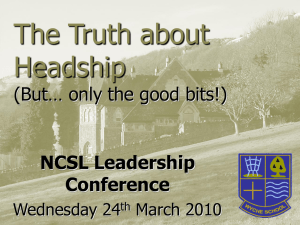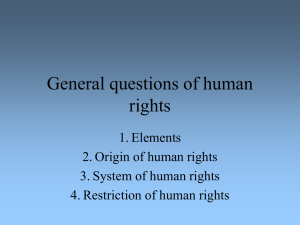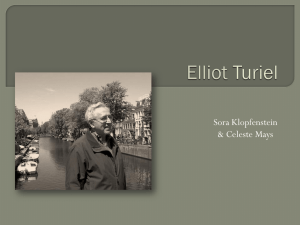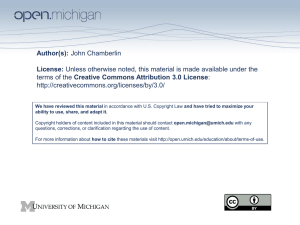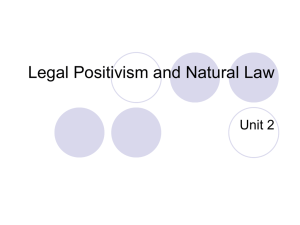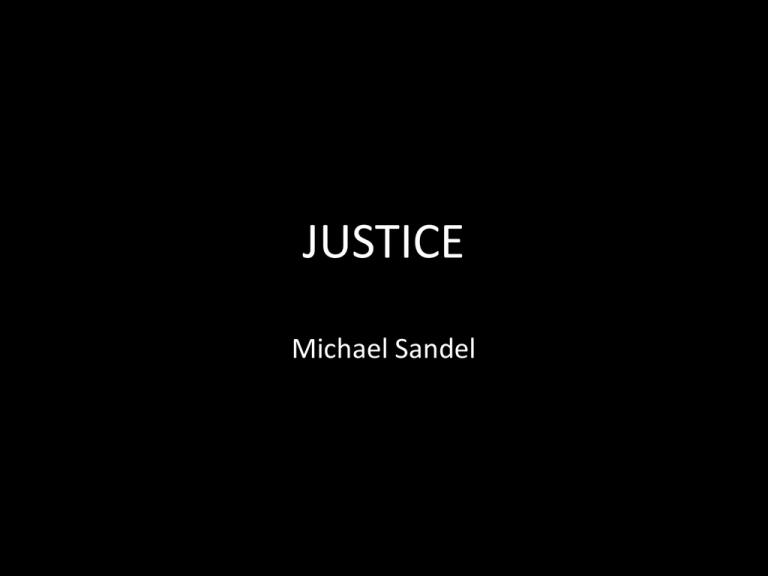
JUSTICE
Michael Sandel
The Greatest Happiness Principle
• Utilitarianism – The greatest happiness for the
greatest number of people
– Cabin boy
– Objection#1 – Individual rights
• Is torture ever justified
– Objection #2 – A common currency of value (cost-benefit
analysis)
Do We Own Ourselves?
• Libertarianism
– The minimal state
– Free market philosophy
• Taxing Bill Gates to help the poor
– Do we own ourselves
• Consensual cannibalism
Hired Help
• Markets and Morals
– What’s just – drafting soldiers or hiring them?
• Objection #1 – Fairness and freedom
• Objection #2 – Civic virtue and the common good
– Outsourcing pregnancy
– Questions:
• How free are the choices we make in a free market?
• Are there certain virtues and higher goods that markets do not
honor and money cannot buy?
What Matters Is the Motive
• Immanuel Kant
– The Categorical Imperative
– Emphasis on human dignity – people as ends in
themselves
• Autonomous according to a law we give ourselves – Free will (nondeterministic)
• What’s moral? Look for the motive – do the right thing for the
right reason.
• Duty vs. inclination
– I.e. Kant was against casual sex.
The Case for Equality
• John Rawls
– The moral limits of contracts
– Behind a veil of ignorance
• Not utilitarianism
• The difference principle – only those social and economic
inequalities are permitted that work to the benefit of the least
advantaged members of society.
– Did Gates’s wealth arise as part of system that, taken as a
whole, works to the benefit of the least well off?
– Incentives
– CEOs and sports starts don’t deserve more money but
because a system of progressive taxation helps the
disadvantaged
• Rawls:
– Share each other’s fate and avail ourselves of the accidents
of nature and social circumstance only when doing so is for
the common benefit.
– The most compelling case for more equal society that
American political philosophy as yet produced.
Arguing Affirmative Action
•
•
•
•
Correcting for the testing gap
Compensating for past wrongs
Promoting diversity
Do racial preferences violate rights?
– Racial segregation and anti-jewish quotas
• Can justice be detached from moral desert?
• The proper mission of social institutions is contested
and fraught …
Who Deservers What?
• Aristotle
– Justice, Telos and Honor
– Justice is teleological – Defining rights requires us to figure
out the telos (the purpose, end, or essential nature) of the
social practice in question.
– Justice is honorific – To reason about the purpose of
practice, means to reason (argue) about what virtues it
should honor and reward.
– What’s the purpose of university, of politics?
• Learning by doing – learning by deliberation and discussion
• Negotiating between two extremes
What Do We Owe Each Other
• Dilemmas of Loyalty
–
–
–
–
–
–
Apologies and reparations
Should we atone for the sins of our predecessors?
Moral individualism
Should government by morally neutral?
Justice and freedom
The claims of the community
• Obligations of solidarity, loyalty historic memory, and religious faith –
moral claims that arise from the communities and traditions that
shape our identity.
– Storytelling beings
• We, as moral agents, arrive at our purposes and ends through telling
stories
• Obligations beyond consent
– Natural duties we owe to other human beings – to persons
as persons.
• Three categories of moral responsibility:
1. Natural duties: universal, don’t require consent
2. Voluntary obligations: particular, require consent
3. Obligations of solidarity: particular, don’t require consent
• Solidarity and Belonging
– Family obligations
– French resistance
– Rescuing Ethiopian Jews
• Is patriotism a virtue?
– Border patrols
– Is it unfair to “Buy American?”
• Can loyalty override universal moral principles?
– Robert E. Lee
– The Bulger brothers and David Kaczynski
Justice and the Common Good
• Kennedy speech about religion – moral neutrality
– Rawls – Need for tolerance in the face of disagreements
and abide by the limits of liberal public reason.
• “How would our argument strike us in the form of a Supreme
Court opinion?”
• Obama rejected moral neutrality
– Abortion issue and stem cell debates and same –sex
marriage
• Morally neutral?
• Freedom of choice?
• Depends on definitions of purpose
– Committed relationship, recognition of the state
• A politics of the common good
– If a just society involves reasoning together about the good
life, what kind of discourse would point us in this
direction?
– The challenge is to imagine a politics that takes moral and
spiritual questions seriously, but brings them to bear on
broad economic and civic concerns …on all issues.
• A just society requires a strong sense of community,
and it must cultivate in citizens a concern for the
whole, a dedication to the common good.
• A politics of moral engagement
– Based on mutual respect as human beings
– Lack of engagement makes for an impoverished public
discourse and lessening of mutual respect.
– “A politics of moral engagement is not only a more
inspiring ideal than a politics of avoidance. It is also a
more promising basis for a just society.”








